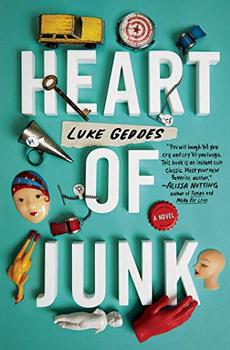Summary | Excerpt | Reviews | Beyond the Book | Readalikes | Genres & Themes | Author Bio

She waited until their backs were turned to slip out of her booth and down the aisle, named, according to the wood-carved street sign hanging from the ceiling, Memory Lane, but one of the men—the blond, mustachioed one—cornered her and stuck out a visibly moist palm. "Hello there." She nodded, tried to smile, took his hand daintily. "We're new," he said unnecessarily.
The dark-haired one, his hands tangled in a bundle of video game joysticks, turned and said hello, but not so friendlily as the other. He looked at his partner in a way to suggest that the blond always talked to strangers in terms too intimate and that, although the dark-haired man didn't like it, he was helpless to stop him. There was something obscenely paternal in that look, especially given that the dark-haired one, judging by his receding hairline and the thin skin around his eyes, appeared significantly older than the blond. Wasn't that the way it worked with these homosexuals? Their relationships hinged on bizarre power struggles that reversed themselves in the privacy of their bedroom, culminating in unimaginable acts of perversion. Anyway, something was off about these two. They were both so tall and thin. As a couple, they seemed unbalanced. Wasn't one of them supposed to be short and stout, the Laurel and Hardy dynamic? They were gays of a type that used to be popular on raunchy television sitcoms that Margaret, as a rule, refused to enjoy: Hawaiian-shirt-wearers who drank flamboyantly named martinis like fuzzy navels, sex on the beaches, and pink flamingos, who called themselves bitches and meant it as a compliment, who used words like po-mo and kitsch and camp as if anyone knew what they meant.
"I don't think we have room for this, Lee," Blond said to Dark Hair, motioning to a large Styrofoam hamburger, the vestige of a defunct and better-off-forgotten novelty diner. He turned to Margaret and said, "You mind if we keep it in your booth?" Margaret must have blanched, because he touched her shoulder and said, "Only kidding, dear," and then, "Seymour," more like an exclamation than a way of identifying himself.
"Margaret," Margaret said uncertainly. "Booth one-dash-one-thirty-eight, corner of Memory Lane and Treasure Way." Seymour didn't say anything, so she added, "Welcome aboard." The words tasted sour, camp counselorish, and unnatural. Already these men's tackiness was affecting her. After a few weeks' exposure, she'd be decorating her mantel with plastic fast-food prizes and those googly-eyed fuzzballs with sticker feet, wearing shirts that jingled with myriad gaudy charms and buttons sewn in willy-nilly patterns, eating Lucky Charms for breakfast out of a Tiffany bowl.
Seymour said, "Don't mind us. We're just settling in. Got this booth here and one in Hall Three for our vinyl."
She prayed that by vinyl he meant record albums and not some sort of depraved sex apparel. You just never knew when it came to these people. They had been here less than a day and already they'd staked their claim to multiple halls! As much as it would anguish her, Margaret would have to investigate their other booth later. As the Heart of America's senior-most dealer, it was her duty.
"Nice to meet you," Lee said without sincerity and then left, probably to gather even more junk. Frankly, she preferred his rudeness to Seymour's hello there aren't I cute brand of social charm. He was presently digging through the boxes and humming. Having made himself known, he evidently had no interest in continuing the conversation, no desire to ask Margaret what sorts of antiques (official dictionary definition) interested her, how long she'd been in the industry, or if she would introduce him to the community of dealers who made the Heart of America their home away from home. Just as she was preparing to sigh pointedly and leave for the café, he yanked out of a box an object so vile and blatantly violative to the mall's clear policy guidelines that Margaret swore she could taste—she could actually taste—a wisp of vomit in the back of her throat.
Excerpted from Heart of Junk by Luke Geddes. Copyright © 2020 by Luke Geddes. Excerpted by permission of Simon & Schuster. All rights reserved. No part of this excerpt may be reproduced or reprinted without permission in writing from the publisher.
Idealism increases in direct proportion to one's distance from the problem.
Click Here to find out who said this, as well as discovering other famous literary quotes!
Your guide toexceptional books
BookBrowse seeks out and recommends the best in contemporary fiction and nonfiction—books that not only engage and entertain but also deepen our understanding of ourselves and the world around us.